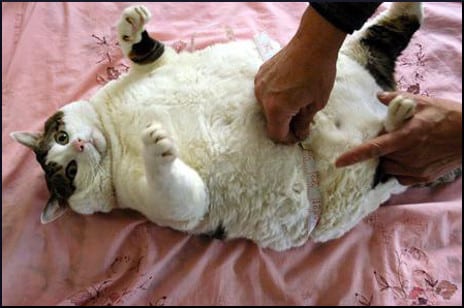
When a child or pet is given an edible treat as a band-aid to cover every incidence of depression, anxiety, isolation, boredom, emotional pain, or other form of psychological stress, no good can come of it. Comfort eating is an easy habit to catch. Actual changes in the brain reinforce the habit, and next thing you know, it’s a full-blown addiction process.
Childhood Obesity News has been discussing the British Journal of Nutrition article written by Dr. Robert A Pretlow and Dr. Ronald J. Corbee. The “Conclusions” section of “Similarities between obesity in pets and children: the addiction model” reads:
The causes of pet and child obesity are strikingly similar. Accordingly, treatment should basically follow the same approach. Staged food withdrawal, along with behavioral addiction treatment methods, is appropriate for both overweight children and overweight pets. Ostensibly, this approach should be more feasible in pets, as access to food is more controllable in pets. Nonetheless, pet–parent co-dependence is likely as daunting to treat as child–parent co-dependence.
Psychological dependence is just another form of addiction, and it usually escalates. Tolerance sets in, and both parties want more and more of the commodity they are trading. It takes more and better treats to keep one party happy, and it takes more and better love to keep the other party happy.
Whether the treat collector is a child or a pet, the mechanism is the same, and weight gain is the inevitable result. At some point, it is to be hoped that the person in charge will perceive the drift toward obesity and make an effort to reverse it. What happens next? According to the study:
Both the pet–parent and the pet then experience withdrawal symptoms, and the pet may become unaffectionate as a result… The pet may even become aggressive or dominant and bite or show negative behaviours towards the pet–parent or others in the household when food is restricted. Thus, the pet–parent is held “hostage” to the extra food and treats to keep the pet happy.
Obviously this situation is easier to avoid than to mend. When it does undeniably exist, the first thing to do is realize and acknowledge that it is an addiction problem. What can be done about it? Anyone familiar with Dr. Pretlow’s W8Loss2Go smartphone application will see the potential for adapting this program for use with pets. Both overweight children and overweight pets benefit from this program “based on classic addiction medicine techniques of withdrawal/abstinence, combined with behavioral addiction treatment methods.”
Staged “problem food” withdrawal is followed by withdrawal from eating between meals, and for both of these the parent will need good coping skills and a thick skin. If the little critter is denied a full ration of treats, it may retaliate by tearing up the paycheck and withholding the currency of affection.
It takes about 10 days for a child or a pet to get used to the reality of a regime change, and the idea that things will be like this from now on. But a parent can crumble on Day One. If there are two parents, it is to be hoped that they are “on the same page,” with neither undermining the other’s efforts. A single parent might seek out a situational therapist, or enlist the coaching support of a friend.
Cat owners in particular are prone to leaving food in the pet bowl all the time, and this is an absolute no-no. The recommendation is for two separate and distinct meals, with no food left in the bowl between times. (Of course, fresh water should always be available.) For more tips, see the study we’ve mentioned above.
Your responses and feedback are welcome!
Source: “Similarities between obesity in pets and children: the addiction model,” Cambridge.org, 06/17/16
Photo credit: Yukari* via Visualhunt.com/CC BY-SA

 FAQs and Media Requests:
FAQs and Media Requests: 











